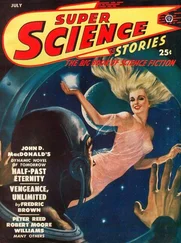“Don’t try to get out,” he said.
“What do you want?”
“I want to talk to you, Sewell. But not here.”
“How about my place?” I suggested.
He thought that over. “Who’s there?”
“There’s nobody there.”
He found the right key and drove my car. I gave him the directions. I didn’t know what I should do — he had started with painful violence, but he sounded reasonable. Maybe he just wanted to talk. I sensed that I could get the door open and get out of the car before he could grab me. We turned into my drive. He turned off the lights and motor and caught my wrist again. He forced me out my side of the car, following me. He looked toward the apartment door. I had left the lights on. He marched me over into the darkness of the side lot, twisted my wrist up into my back and cursed me again.
“What do you want?” I asked, fighting to keep my voice level and unafraid.
He didn’t want to talk with me, he wanted to tell me. He told me I had taken her away from him. He told me she was dead and it was my fault. He kept his voice low, his mouth close to my ear. I sensed that he was losing control. He told me I had to keep away from her. I felt lost and helpless. In his increasing excitement he was close to breaking my arm. I groaned with pain, wishing I had tried to get away from him while we were in the car. I knew my arm would snap. I tried to yell for help, hoping to arouse somebody, hoping to frighten him, or startle him back to relative sanity. He caught my throat, choking off the yell, his heavy forearm across my throat, big knee digging into the small of my back. I managed to turn in his grasp and we both fell. He grasped my throat in his big hands. My right arm was useless. Red pinwheels circled behind my eyes and somebody turned the night off, the way you turn off a light.
When I recovered consciousness I was flat on my back in the night, on the grass, looking up at stars through the May leaves of the elms, my throat hurting with each breath. I could hear heavy breathing close by. After a long time I sat up. Yeagger was beside me on his face, blood on his cheek shining black in the faint starlight.
I massaged my right arm; it felt weak and limp. I wobbled a bit when I stood up. I felt as though someone watched me from the deep shadows under the trees. I managed to roll Yeagger over onto his back. He grunted and threw a big forearm across his eyes. After a long time he sat up and stared at me blankly. I helped him to his feet. He leaned on me heavily and I took him into the apartment. He sat in a chair, elbows on his knees, eyes closed. I moved the light so I could see his head. Above his left temple there was a split in the scalp about an inch long. The area around it was badly swollen. I wet the end of a towel in the bathroom sink and brought it to him. He wiped the blood from his face and held the towel against the slowly bleeding wound.
“What happened?” I asked. I had to ask him twice before he looked directly at me.
“I... I guess I was trying to kill you. I heard somebody behind me. I started to turn and... that’s all.”
“It’s a damn good thing somebody stopped you,” I said.
He looked at me and frowned. “I... Everything is shot. Everything. Mary was the one thing that meant anything. You were the one who...”
“I didn’t do a damn thing. She was a tramp, Yeagger. You were just temporary fun and games. If it meant a hell of a lot to you, that just made the game more interesting. Blame yourself, don’t blame me.”
He looked away from me. “I guess I know that. I guess I knew it all along. But... I’m sorry I went after you and...” Astonishingly, the big tough face crumpled, twisted up like a child’s, and he began to cry. It made me acutely embarrassed. He covered his eyes with a big hand and sobbed harshly. After a time he stopped, and knuckled his eyes. He wouldn’t look toward me again. I told him he ought to have a stitch taken in his head; he said it didn’t matter. I asked him how he’d get back up to the lake country; he said that didn’t matter either. He was anxious to go. If he hadn’t been hit he would have killed me. But I could no longer feel indignation or anger. I felt sorry for him. Big and hard as he was, he was a child underneath. He blamed me for breaking his toys, that was all. I stood out in the drive and watched him walk to the street and turn toward town, a big shadow fading into the night.
I looked out toward the lot and felt again that someone was there. It was an atavistic quiver of warning, legacy from the days of the sabertooth. The world was suddenly dark and large and unfriendly. Yeagger had been eliminated. Someone, for an unknown reason, had halted a murder. On this night I could believe it had been halted only to be consummated later, by someone else. I went in to bed and wondered if it would have mattered to anyone if my life had ended there with Yeagger’s hands on my throat. It could so easily have ended — and my last conscious perception would have been of the rockets behind my eyes and the world turned off by a monster switch.
The feeling of depression was still with me the next morning when I awoke. My arm was lame, but more serviceable than I had expected. My throat was sore, my voice husky. The episode with Yeagger seemed like a dream sequence, too unreal to reawaken fear. During all my dreams that night, someone had stood in shadow and watched me.
As I went out my driveway I saw Mrs. Speers standing in a window. I remembered that I had not collected her trash.
At the plant the floor was ready for two new pieces of heavy equipment. Two experts were there from the machine tool company. It took half the morning to set the equipment in place, make the power hookups and bolt it down. Then we went over it with Gus and with engineering and the experts until we knew all the tricks. At three I still hadn’t had lunch. I went to the locker room, took the protective coveralls off, scoured the grease off my hands and put my suit coat on.
Dodd Raymond came in. He seemed vague, distracted.
“Understand they let Yeagger go,” he said.
“That’s right. Last night. I was there.”
“What were you doing down there, Clint?”
“They wanted fingerprints. Did they get yours?”
“Yes. That Paul France stopped in at the house last night. Asked a lot of questions. Strange sort of guy.”
I finished drying my hands and turned to face him. “Did he ask about the key the Bettiger woman mentioned?”
“Why should he?”
“Dodd, Mary told me about you and the key and your little hideaway.”
He flushed angrily. “She promised not to say anything to anybody.”
“You were pretty foolish, weren’t you?”
I saw his face change. “Don’t forget yourself, Sewell.”
“Forget you’re the boss? No. But what do I say if I’m asked about it?”
He immediately became ingratiating. “Clint, I didn’t mean to get stuffy. Actually, it wouldn’t help the police any to tell them that. If she told you, you know I had a place on the west side of town. I’m going to get my stuff out of there as soon as I get a chance. It was a damn fool thing to do. But I lost my head, I guess. We met there six or seven times, that’s all. It wouldn’t help the police, and it might break up my home. Nancy doesn’t know anything about it. I’d appreciate it if you’d just... let it ride. After all, I didn’t kill her. That ought to be pretty obvious.”
“So who did kill her, Dodd?”
He moved over to a mirror, straightened his necktie. “I haven’t any idea,” he said. But I saw his eyes in the mirror. I sensed that he lied. Maybe he didn’t actually know, but I think he had an idea. A good idea.
After he extracted my halfhearted promise not to mention it, he left. I went back to my office. Toni and I had been slightly awkward with each other all day, and I had covered up by being intensely impersonal. Now hunger gnawed at my nerves and I snarled at her, and saw her eyes fill with tears as she turned hastily away. I apologized to her, tried to get her to smile. It was a cool little smile at first, and then it turned into the grin that was so good to see. She went out and brought me back milk and a sandwich.
Читать дальше
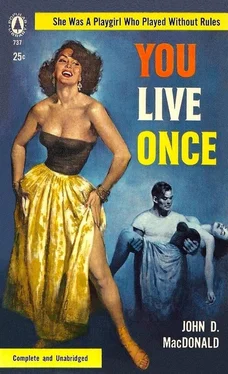
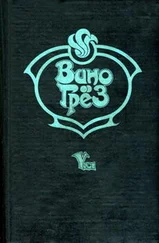
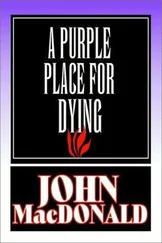
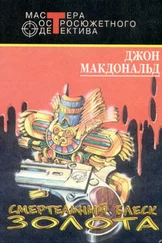
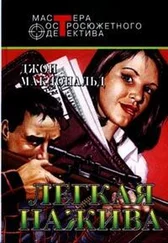
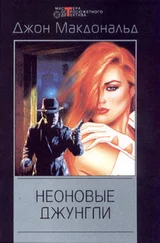
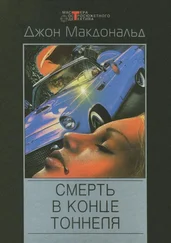
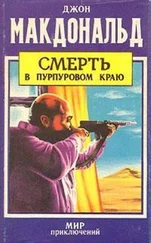
![Джон Макдональд - Wine of the Dreamers [= Planet of the Dreamers]](/books/430039/dzhon-makdonald-wine-of-the-dreamers-planet-of-thumb.webp)
![Джон Макдональд - Finding Anne Farley [= Ring My Love with Diamonds]](/books/430180/dzhon-makdonald-finding-anne-farley-ring-my-lov-thumb.webp)

